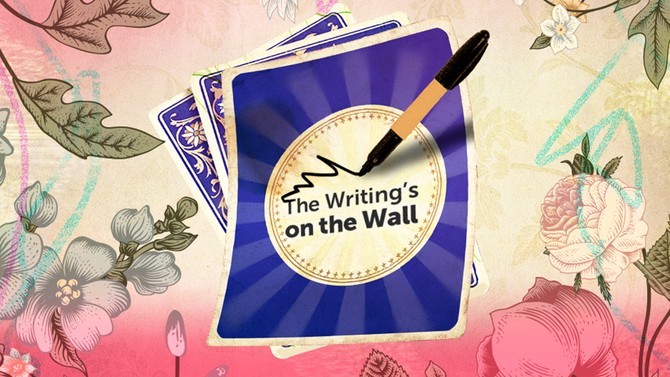11 Moments When the Universe Is Speaking to You
Some events are so uncanny, they force us to question whether life is random or something magical is at play. Other marvels are quieter but still have the power to transform our lives.
Justine Blau's poetic encounter with her mother's memory.
I was waiting to be seated at Manhattan's Cafe Lalo two years ago when I noticed, inscribed on a tile wall, a poem titled "To Be Alive." It was dated 1976, and signed by my mother.
As a child I'd lived in fear of her uninvited appearances. She was a restless, troubled soul, a volatile force in my life at the best of times. As kids, my brothers and I moved in and out of hotels, occasionally spending nights in 24-hour coffee shops or on the subway. Once, my mother and I slept in the ladies' room of a funeral parlor. When I was 11, a court took me away from my mother, but she disobeyed visiting rules, showing up unannounced at the group homes where I was placed, demanding to see me. After she kidnapped me from one of them, she was arrested and briefly placed in a mental hospital. For decades she wandered New York City, bartering poetry for coffee and slices of cake.
And here she was, almost ten years after her death, arriving unannounced once again.
I spoke to the café manager and was stunned when she told me her fourth-grade daughter had memorized the poem for a class assignment. I called the owner, who said he had never met my mother and wasn't sure how her work had made its way to the restaurant. He told me his name was Haim, the Hebrew word for "life." It's also my grandfather's and my son's. Life—its wonder, its beauty—was something my mother cherished. Her poem begins, "It's good to be alive / To laugh and love and thrive." On my way out, I noticed that "To Be Alive" is printed on the café's takeout menu. I searched for the poem online and found that it also lives on many inspirational blogs and cancer-support websites.
My mother often left me shaken and afraid. But discovering that to some she is a source of wisdom reminded me of the gift she had given me: a passion for life. And it's good to be alive, to laugh and love and thrive.
I was waiting to be seated at Manhattan's Cafe Lalo two years ago when I noticed, inscribed on a tile wall, a poem titled "To Be Alive." It was dated 1976, and signed by my mother.
As a child I'd lived in fear of her uninvited appearances. She was a restless, troubled soul, a volatile force in my life at the best of times. As kids, my brothers and I moved in and out of hotels, occasionally spending nights in 24-hour coffee shops or on the subway. Once, my mother and I slept in the ladies' room of a funeral parlor. When I was 11, a court took me away from my mother, but she disobeyed visiting rules, showing up unannounced at the group homes where I was placed, demanding to see me. After she kidnapped me from one of them, she was arrested and briefly placed in a mental hospital. For decades she wandered New York City, bartering poetry for coffee and slices of cake.
And here she was, almost ten years after her death, arriving unannounced once again.
I spoke to the café manager and was stunned when she told me her fourth-grade daughter had memorized the poem for a class assignment. I called the owner, who said he had never met my mother and wasn't sure how her work had made its way to the restaurant. He told me his name was Haim, the Hebrew word for "life." It's also my grandfather's and my son's. Life—its wonder, its beauty—was something my mother cherished. Her poem begins, "It's good to be alive / To laugh and love and thrive." On my way out, I noticed that "To Be Alive" is printed on the café's takeout menu. I searched for the poem online and found that it also lives on many inspirational blogs and cancer-support websites.
My mother often left me shaken and afraid. But discovering that to some she is a source of wisdom reminded me of the gift she had given me: a passion for life. And it's good to be alive, to laugh and love and thrive.
From the December 2014 issue of O, The Oprah Magazine


